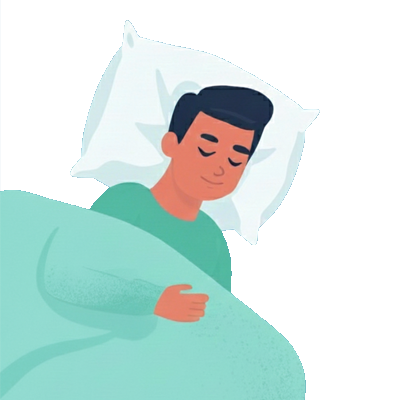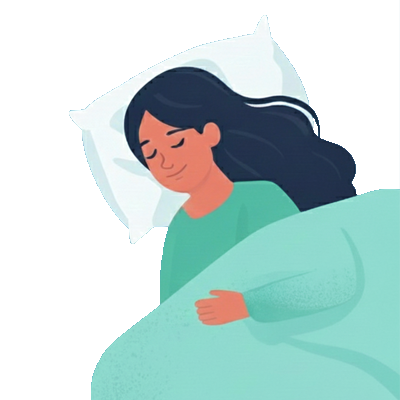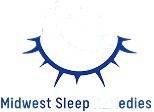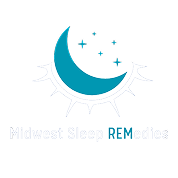Ever feel tired all day, even after a full 8 hours of sleep? Or wake up feeling unrefreshed, struggling to stay focused and energized? Or maybe even simple tasks leave you completely drained.
If this sounds familiar, you might be dealing with something more serious than just being “tired.” It could be sleep apnea, a hidden condition that silently disrupts your sleep and leaves you physically and mentally exhausted the next morning.
In this blog, we’ll walk through what sleep apnea is, how sleep apnea and fatigue are closely connected, and why this combination is a leading cause of accidents and injuries, whether it’s on the road, at work, or even in your own home.
Key Takeaways:
- Sleep apnea is a sleep disorder that repeatedly interrupts your breathing during sleep.
- Daytime fatigue caused by sleep apnea can lead to chronic exhaustion, poor concentration, and mood swings.
- Sleep apnea and fatigue form a vicious cycle.
- Daytime drowsiness increases the risk of accidents at work, while driving, and even during routine tasks at home.
What Is Sleep Apnea? And Why Does It Drain Your Energy?
Sleep apnea is not just related to loud snoring and restless nights. It’s a sleep disorder that causes frequent interruptions in breathing while you sleep. These interruptions in your sleep force your body to briefly wake up multiple times throughout the night to restore normal breathing.
Because of this, your body never reaches the deep, restorative stage of sleep it normally needs. As a result, you wake up feeling mentally drained and physically exhausted. Additionally, you might struggle with constant fatigue and excessive sleepiness during the day, even after spending the whole night in bed.
The Vicious Cycle: How Sleep Apnea Leads to Chronic Fatigue
Well, sleep apnea is not just one bad night; its effects follow you throughout the day. The fatigue and tiredness caused by sleep apnea becomes a part of everyday life. It doesn’t only disrupt your sleep, but also makes you feel low, irritated, and mentally drained.
Over time, this temporary tiredness turns into chronic fatigue, making it hard to concentrate and stay productive. In turn, you may lose motivation to work, socialize, or take care of yourself. Additionally, as your activity level drops, your overall health begins to deteriorate, which can further worsen the symptoms of sleep apnea.
This creates a vicious cycle where sleep apnea and fatigue keep exacerbating each other. Poor sleep leads to exhaustion, exhaustion affects your health, and poor health further disrupts your sleep. This ongoing cycle can compromise both your mental and physical health. However, overcoming it requires proper diagnosis and consistent treatment.
As this cycle continues, the resulting daytime fatigue increases the risk of serious accidents, such as falling asleep while driving or making dangerous mistakes at work or home.
Let’s move forward and discuss how sleep apnea can be the leading cause of accidents and injuries.
Looking for a Comfortable Way to Manage Sleep Apnea?
Discover custom oral appliances designed to treat sleep apnea comfortably and effectively.




Daytime Sleepiness and Daily Life: The Risks You Don’t Always See Coming
Excessive sleepiness during the day isn’t just inconvenient; it’s dangerous. When your brain and body are severely fatigued, simple tasks can become risky. Whether you’re driving, handling machinery, or just crossing the street, fatigue can put you and others in harm.
Ever thought about how many of us have driven while feeling drowsy, thinking we could just “push through it”? It’s more common than most people realize. But did you know that studies show drowsy driving can be just as dangerous as drunk driving. Well, one of the major and often overlooked causes behind this is sleep apnea.
Here are a few situations where daytime fatigue can turn risky:
- Behind the wheel: Slower reaction time, drifting off for a second, or missing signs.
- At work: Making errors, especially in jobs that require focus or precision.
- At home: Falling asleep while cooking, missing steps, or even falling downstairs.
It doesn’t have to be a major crash; even a small mistake can quickly turn into something serious. Furthermore, sleep apnea and fatigue quietly affect your focus, slow your reaction time, and ultimately compromise your health before you even realize it.
What You Can Do About It: Spot the Signs Early
The first step to protecting yourself from the hidden dangers of sleep apnea is knowing what to look for. Most people don’t realize they have sleep apnea until the symptoms appear and begin interfering with their daily lives.
Moreover, you might not notice the pauses in your breathing while you sleep, but your body shows the warning signs during the daytime. If you experience excessive sleepiness during the day, even after resting for a full night, you might have to pay attention.
Persistent yawning, zoning out in meetings, or requiring multiple cups of coffee to stay active may be more than just a busy lifestyle; they could point to sleep apnea and chronic fatigue.
Other common symptoms include:
- Loud snoring, especially when paired with gasping or choking sounds
- Morning headaches or dry mouth
- Difficulty concentrating or memory issues
- Irritability and mood swings
- Trouble staying awake while reading, watching TV, or driving
Recognizing these red flags can help prevent further health issues. If left untreated, sleep apnea can increase your risk of serious health conditions like heart disease, stroke, or type 2 diabetes.
Moving further, early diagnosis and proper treatment, such as oral appliances and CPAP therapy, lifestyle changes, or weight management, can help you restore energy and enhance sleep quality too.
Conclusion
Sleep apnea and fatigue are more than just sleep-related problems; they are serious health issues that silently impact your safety, productivity, and overall well-being. When your body doesn’t get the deep, restorative rest it needs, it leaves you vulnerable to chronic tiredness and lack of concentration. More importantly, chronic fatigue due to sleep apnea is one of the leading causes of accidents and injuries.
However, by recognizing the early warning signs and seeking timely treatment, you can break the cycle of poor sleep and chronic fatigue. If you’re experiencing symptoms of either condition, it’s important to seek help. At Midwest Sleep Remedies, we offer specialized support and treatment options to help you manage sleep disorders.
Have Questions About Disturbed Sleep?
Don’t wait for the symptoms to get worse. Talk to your doctor, get tested, and take the steps toward better sleep and a healthier life.










